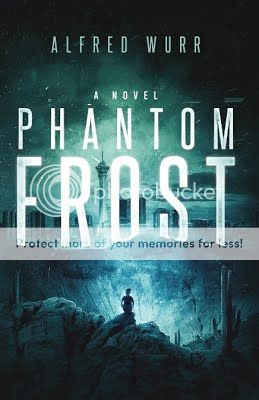Morning, squiders! Hope you’re having a good Thanksgiving week, if you’re somewhere that celebrates such things, and if not, hopefully you’re at least not buried in snow, like I am.
Today I’ve got a sale for you. This book sounds super cool, not going to lie. The book is normally $5.99, so if it sounds interesting to you too, it’s a good deal.

Sci-fi Fantasy
Date Published: October 2019
A unique sci-fi/fantasy crossover novel set in the universe of the forthcoming Wurreal Games video game.
Shivurr remembers little before the Bodhi Institute, the secret government installation where he’s been held and studied like a lab rat for the past decade.
It hasn’t been all bad, though, for a soda-pop-loving sci-fi fanboy, especially in 1983. He’s got all the TV, movies and arcade games he could ever want. But lately, flashes of his forgotten past have invaded his dreams: visions of an ancient chamber where the mysteries of his origin may finally be resolved.
Compelled to find it, Shivurr embarks on a quest, fleeing the facility in the dark of night. Escaping is easy; the Bodhi Group guards didn’t dream he’d ever try. The Nevada desert is dangerous for warm bloods; for a snowman, it’s pretty much suicide, even for one with his seemingly magical command of frost and ice.
Hunted by Bodhi Group agents, keeping to the shade when he can find it, he’s determined to survive; he’s got a feeling the world may depend on it. And, if he doesn’t, well, everyone melts eventually, right?
No matter how cool you are, everyone melts, eventually. Those words echoed through my head as I raced across the desert floor, heading northeast toward Lunar Crater, under the Nevada sun. Where I had heard them before, I couldn’t recall. My memory wasn’t what it used to be, but I would hear those words spoken to me in my dreams sometimes, stepping out of the inky black fog of my damaged memory. I think someone close to me had said them ages ago. They were strange words since the only person I knew of for whom melting was a concern was me. Regardless, seldom before was that fate as likely to occur for someone—that being me—as it was today.
I’d been gulping dry air and daydreaming of cold cans of soda pop, muttering product slogans to myself to keep my spirits up for several miles now. Steam rose from my icy shoulders, trailing me in wisps, disappearing into the dry desert air a few feet back. My cold feet left wet footprints on the sandy ground that soon evaporated into nothingness. I kicked a loose rock, stumbled, but caught myself before falling.
Without more moisture, I’ll soon be eating dust, I thought. Just a hot mess for the agents to find. Scratch that—my corpse won’t be around long enough. I’ll melt away, leaving only a trail of faint roundish footprints leading nowhere. They’ll think I flew away, picked up by Soviet agents in a helicopter. I’d love to see Dixon’s face, thinking the Reds got me.
Nineteen hours earlier, I’d escaped a prison—the labs of a top-secret research facility called the Bodhi Institute. For about a decade, I’d been an unwilling participant in more experiments than I care to remember. I’d slipped out a side door in the middle of the night with a small cache of supplies provided by my best friend, Scott. It was easier than expected, but I guess I didn’t seem suicidal to the Bodhi Group watchmen. The weak part of me wished I were back there: trapped but cool, a glass of ice water in hand, watching TV, reading a book, or taking a nap. But my nightmares made that impossible. I’d ignored them for months, while they haunted only my sleep. But when they’d invaded my waking hours, I had to go. I had to find answers. I had to find the ancient chamber that stood at their epicentre and that some instinct told me lay ahead of me, in the desert waste.
I didn’t know who I was or where I came from. Not really; not fully. Sure, I remembered most of the years of my detention with crystal clarity. I knew what I was: an organism of snow and ice, unique in all the world. A snowman, they called me; cold hands with a warm heart. I knew what I was capable of; even with no legs, my feet run like the wind and allow me to jump as high as I am tall. I can do other things—things that frighten and astonish people, people like those chasing me. So much so, they’d locked me up and studied me like a lab rat for the past decade. I remembered all that, but little to nothing further into my past than my capture and imprisonment. And I remembered my name, Shivurr, but it was a name, an identity, that lacked history or context, which was both freeing and frustrating.
About the Author

Alfred Wurr is a Canadian author, video game and software developer, computer scientist, and former Olympic wrestler.
I should be back Friday to tell you how Nano went. Eat some mashed potatoes for me, squiders.







